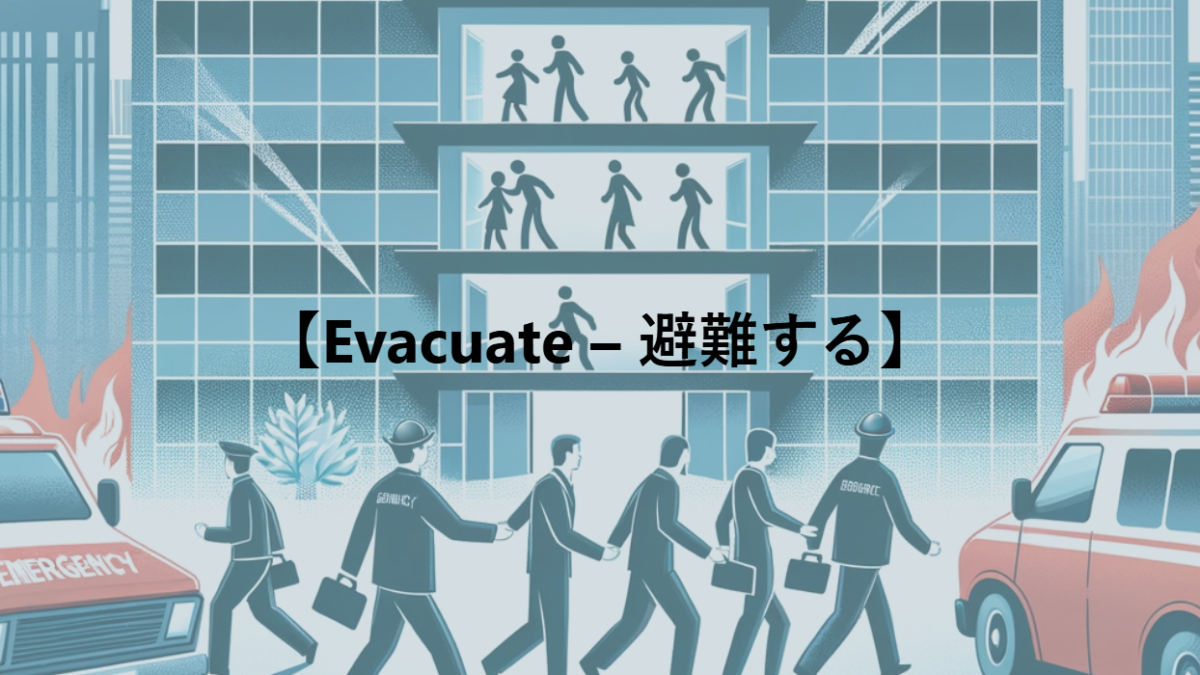語源・類義語・反対語・例文
【Evacuate – 避難する】という単語の語源とか由来を知っていますか?
「Evacuate」は、ラテン語の「evacuare」から来ています。これは、「空にする」または「空っぽにする」という意味です。元々は主に物理的な内容物を取り除くことを指す言葉でしたが、時間が経つにつれて、人々を危険な場所から移動させる、つまり「避難する」という意味で使われるようになりました。この言葉は、「空」という意味のラテン語「vacuus」から派生したもので、空間を空にすることから人々を安全な場所へ移動させるという現代の使い方に進化しました。
The word “evacuate” originates from the Latin “evacuare,” which means “to empty” or “to make void.” Initially, it referred mainly to the act of removing physical contents, but over time, it has come to mean moving people from a dangerous place, that is, “to evacuate.” This term is derived from “vacuus,” a Latin word meaning “empty,” evolving from the concept of making a space empty to the modern usage of moving people to a safer location.
この単語の類義語・反対語を教えてください。
類義語:
- Flee: 逃げる
- Exit: 出る、退出する
- Withdraw: 撤退する
- Depart: 出発する
- Escape: 脱出する
- Leave: 去る
反対語:
- Arrive: 到着する
- Enter: 入る
- Occupy: 占拠する
- Settle: 定住する
- Stay: 滞在する
- Inhabit: 居住する
この単語に似た単語で間違いやすい単語はありますか?
- Evaporate: 意味は「蒸発する」で、液体が気体に変わる過程を指します。音が似ているため混同されることがありますが、意味は全く異なります。
- Evaluate: 意味は「評価する」で、何かを査定したり価値を判断する行為を意味します。「Evacuate」とは関連がありません。
- Emanate: 意味は「発する」や「放つ」で、何かが源から発生する様子を表します。これも「Evacuate」とは全く異なる意味を持ちます。
- Extricate: 意味は「解放する」や「難局から救い出す」といった感じです。時として人々を困難な状況から救い出すことと関連付けられますが、「Evacuate」とは異なり、特に複雑や危険な状況からの脱出や解放に重点を置きます。
この単語を使った例文を5つほど教えてください。
Due to the approaching hurricane, the coastal residents were ordered to evacuate their homes.
(接近するハリケーンのため、沿岸の住民は自宅を避難するよう命じられました。)
The embassy issued an evacuation notice to all its staff members in the conflict-affected region.
(大使館は紛争地域にいる全スタッフに避難勧告を出しました。)
When the fire alarm sounded, everyone quickly evacuated the building and gathered at the designated meeting point.
(火災報知器が鳴った時、皆は迅速に建物を避難し、指定された集合場所に集まりました。)
The government established evacuation centers to accommodate the displaced people during the flood.
(政府は洪水時に避難民を収容するための避難センターを設置しました。)
The military conducted a rescue operation to evacuate stranded hikers from the mountain.
(軍は山で立ち往生しているハイカーを救助するための避難作戦を実施しました。)
【Evacuate – 避難する】のコロケーション
- Evacuate the area: 「エリアを避難する」。これは、災害や緊急事態が発生した場合に、特定の地域や場所から人々を安全な場所へ移動させることを意味します。通常、自然災害や人為的な危険が迫っているときに使われます。
- Evacuate residents: 「住民を避難させる」。この表現は、危険や災害の可能性がある場合に、住民を安全な場所へと移動させる行為を指します。政府機関や緊急対応チームがこの行動を取ることが多いです。
- Evacuate a building: 「建物から避難する」。火事、爆発、ガス漏れなどの危険がある場合に、建物内の人々を速やかに外へ出すことを指します。
- Evacuate children and the elderly: 「子供と高齢者を避難させる」。最も脆弱なグループ、特に子供や高齢者を優先して安全な場所へ移動させることを意味します。これは、彼らが災害時に最もリスクが高いと考えられるためです。
- Evacuate before the storm: 「嵐の前に避難する」。特に、台風、ハリケーン、大雨などの悪天候が予測される時に、事前に安全な場所へと避難を始めることを意味します。この行動は、悪化する天候による危険から人々を守るために重要です。
「Evacuate」は、人々を危険や災害から安全な場所へ移動させる行動を指す動詞です。
まず、「Evacuate the area」から始めましょう。この表現は「エリアを避難する」と訳され、災害や緊急事態が発生した際に、特定の地域や場所から人々を安全な場所へ移動させることを意味します。自然災害や人為的な危険が迫っている時に使用されることが一般的です。
次に、「Evacuate residents」です。これは「住民を避難させる」という意味で、危険や災害の可能性がある場合に、住民を安全な場所へと移動させる行動を指します。このプロセスは通常、政府や緊急対応チームによって行われます。
「Evacuate a building」についても触れます。これは「建物から避難する」と訳され、火災や爆発、ガス漏れなどの危険がある場合に、建物内の人々を迅速に外へ避難させることを指します。
さらに、「Evacuate children and the elderly」は、「子供と高齢者を避難させる」という意味です。これは、災害時に最もリスクが高いと考えられる脆弱なグループ、特に子供や高齢者を優先して安全な場所へ移動させることを示します。
最後に、「Evacuate before the storm」です。これは「嵐の前に避難する」と訳され、台風やハリケーン、大雨など悪天候の予報が出ている場合に、事前に安全な場所へ避難を開始することを意味します。これにより、悪化する天候による潜在的な危険から人々を守ることができます。
“Evacuate” is a verb that denotes the action of moving people from a place of danger or disaster to a safe location.
Let’s start with Evacuate the area. This expression translates to “evacuate the area” and signifies the act of moving people from a specific area or location to safety when a disaster or emergency occurs. It is commonly used when natural disasters or man-made threats are imminent.
Next is Evacuate residents. This means “to evacuate residents,” referring to the action of moving residents to a safe location when there is a possibility of danger or disaster. This process is usually carried out by government agencies or emergency response teams.
We also discuss Evacuate a building. This translates to “evacuate a building” and refers to the act of quickly moving people out of a building in case of danger, such as a fire, explosion, or gas leak.
Furthermore, Evacuate children and the elderly means “to evacuate children and the elderly.” This indicates prioritizing the movement of the most vulnerable groups, especially children and the elderly, to safe locations during disasters, considering they are often at the highest risk.
Finally, Evacuate before the storm. This is translated as “evacuate before the storm” and means starting the evacuation to a safe location before the onset of severe weather conditions like typhoons, hurricanes, or heavy rain. This action helps protect people from potential dangers caused by worsening weather conditions.
evacuateを使った文法問題
- Residents were ordered to _____ the building due to a fire alarm.
- (A) evacuates
- (B) evacuated
- (C) evacuate
- (D) evacuation
解答と解説: (C) evacuate
解説: order + O + to不定詞 で「Oに~するように命令する」という意味になります。to不定詞の後なので動詞の原形であるevacuateが適切です。
- The city was _____ ahead of the approaching hurricane.
- (A) evacuates
- (B) evacuated
- (C) evacuate
- (D) evacuation
解答と解説: (B) evacuated
解説: 街が「避難させられた」という受動態を表すには過去分詞であるevacuatedが適切です。
- The school has a well-rehearsed _____ plan in case of an emergency.
- (A) evacuates
- (B) evacuated
- (C) evacuate
- (D) evacuation
解答と解説: (D) evacuation
解説: evacuation plan で「避難計画」という意味になります。
- The passengers were _____ from the plane after it made an emergency landing.
- (A) evacuates
- (B) evacuated
- (C) evacuate
- (D) evacuation
解答と解説: (B) evacuated
解説: 乗客が飛行機から「避難させられた」という受動態を表すには過去分詞であるevacuatedが適切です。
- The building was _____ as a precaution after a structural fault was discovered.
- (A) evacuates
- (B) evacuated
- (C) evacuate
- (D) evacuation
解答と解説: (B) evacuated
解説: 建物が「避難させられた」という受動態を表すには過去分詞であるevacuatedが適切です。

